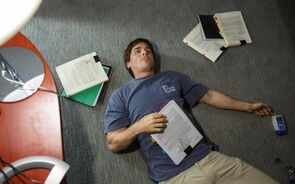Bull marKet dos Bonds durou 20 anos
1 Mensagem
|Página 1 de 1
Bull marKet dos Bonds durou 20 anos
É a opinião (publicada) do Bill Gross.
O retorno do investimento em "OT's" deverá ser diminuto no futuro. Vinte anos de retorno médio excepcional e muito acima do normal (histórico), parece ser dificil de repetir. Impossível num horizonte de muitos anos.
Mas não é como nas acções. Não se desfaz. Nos próximos anos deve dar para a "inflação" e já não é mau. Se tivesse uma forte correcção, o cacau que abunda nas side lines adorava...e o Bill Gross idem.
O combóio do Bond market está a abarrotar...está tudo já muito apertado.
Bear market nos bonds, não significa bull market no mercado accionista.
SE fosse previsível (não é), eu diria que os próximos anos devem ser maus para a generalidade das aplicações tradicionais (fundos de obrigações, acções, ou mistos). Pelo menos, no cenário actual (PER muito alto no SP500 e bonds com yields (historicamente) no tapete, não será razoável ter expectativas optimistas. Tinhamos um bear market, agora são dois.
Em Portugal, a coisa é mais complicada, porque ao retorno há que descontar uma taxa de inflação muito alta (por estas bandas, o vírus da deflação não existe, temos anti-corpos contra essas coisas estranhas oriundas dos Japas).
Boas, e um abraço.
----------------------------------------------------------------------------------
Newport Beach, California, Dec. 3 (Bloomberg) -- The bond market's bull run is over, said Bill Gross, manager of the world's largest bond fund.
A Federal Reserve that has little room left for lowering U.S. interest rates and a perceived determination to prevent deflation, combined with the prospect of larger financial deficits in the U.S., are all bearish signs for the bond market and point to smaller returns for fixed-income investors than in the past few years, he said.
``The bond market's salad days are over,'' Gross, manager of Pacific Investment Management Co.'s Total Return Fund, said on the company's Web site. ``Four-to-5 percent annual total returns at best over the next several years should be expected,'' he wrote.
Even so, some European bonds, higher-yielding emerging market and investment-grade corporate debt, and inflation-protected securities, also known as TIPS, will likely serve investors better than most Treasuries, he said.
The change comes after a sluggish U.S. economic recovery and low interest rates fueled a rally in Treasuries that in October drove yields on five and 10-year notes to the lowest since the 1950s. Ten-year Treasury notes, including reinvested interest, returned investors 16 percent in 2000, 6.6 percent in 2001 and 12 percent so far this year.
Pimco's $67 billion Total Return Fund has returned about 6.9 percent so far this year, according to Bloomberg data.
The rally in Treasury prices this year peaked on Oct. 9, when the yield on the 4 percent Treasury note due in 2012 tumbled to 3.54 percent, a 44-year low.
The Fed on Nov. 6 cut its target rate for overnight loans between banks to a four-decade low of 1.25 percent. It was the 12th rate cut since January 2001 in the central bank's effort to buoy the world's largest economy.
A ``more normal'' fed funds rate would be 2 percent, and the Fed may lift borrowing costs back to that level by the end of 2003, Gross said. Short-term lending ``rates are going no lower,'' he said.
The longer the Fed holds rates down, the less appealing it is to switch into shorter-dated money-market maturities with lower yields and hold it there, Gross said.
As of Oct. 31, Gross increased holdings of notes maturing in one to five years to 46 percent of the fund's assets, from 45 percent. The fund's holdings of those maturing between 10 and 20 years were boosted to 39 percent, from 37 percent.
Also as of late October, Gross's funds that permit euro zone holdings bought German bonds on expectations inflation in the European Union will slow, prompting the central bank to lower interest rates.
O retorno do investimento em "OT's" deverá ser diminuto no futuro. Vinte anos de retorno médio excepcional e muito acima do normal (histórico), parece ser dificil de repetir. Impossível num horizonte de muitos anos.
Mas não é como nas acções. Não se desfaz. Nos próximos anos deve dar para a "inflação" e já não é mau. Se tivesse uma forte correcção, o cacau que abunda nas side lines adorava...e o Bill Gross idem.
O combóio do Bond market está a abarrotar...está tudo já muito apertado.
Bear market nos bonds, não significa bull market no mercado accionista.
SE fosse previsível (não é), eu diria que os próximos anos devem ser maus para a generalidade das aplicações tradicionais (fundos de obrigações, acções, ou mistos). Pelo menos, no cenário actual (PER muito alto no SP500 e bonds com yields (historicamente) no tapete, não será razoável ter expectativas optimistas. Tinhamos um bear market, agora são dois.
Em Portugal, a coisa é mais complicada, porque ao retorno há que descontar uma taxa de inflação muito alta (por estas bandas, o vírus da deflação não existe, temos anti-corpos contra essas coisas estranhas oriundas dos Japas).
Boas, e um abraço.
----------------------------------------------------------------------------------
Newport Beach, California, Dec. 3 (Bloomberg) -- The bond market's bull run is over, said Bill Gross, manager of the world's largest bond fund.
A Federal Reserve that has little room left for lowering U.S. interest rates and a perceived determination to prevent deflation, combined with the prospect of larger financial deficits in the U.S., are all bearish signs for the bond market and point to smaller returns for fixed-income investors than in the past few years, he said.
``The bond market's salad days are over,'' Gross, manager of Pacific Investment Management Co.'s Total Return Fund, said on the company's Web site. ``Four-to-5 percent annual total returns at best over the next several years should be expected,'' he wrote.
Even so, some European bonds, higher-yielding emerging market and investment-grade corporate debt, and inflation-protected securities, also known as TIPS, will likely serve investors better than most Treasuries, he said.
The change comes after a sluggish U.S. economic recovery and low interest rates fueled a rally in Treasuries that in October drove yields on five and 10-year notes to the lowest since the 1950s. Ten-year Treasury notes, including reinvested interest, returned investors 16 percent in 2000, 6.6 percent in 2001 and 12 percent so far this year.
Pimco's $67 billion Total Return Fund has returned about 6.9 percent so far this year, according to Bloomberg data.
The rally in Treasury prices this year peaked on Oct. 9, when the yield on the 4 percent Treasury note due in 2012 tumbled to 3.54 percent, a 44-year low.
The Fed on Nov. 6 cut its target rate for overnight loans between banks to a four-decade low of 1.25 percent. It was the 12th rate cut since January 2001 in the central bank's effort to buoy the world's largest economy.
A ``more normal'' fed funds rate would be 2 percent, and the Fed may lift borrowing costs back to that level by the end of 2003, Gross said. Short-term lending ``rates are going no lower,'' he said.
The longer the Fed holds rates down, the less appealing it is to switch into shorter-dated money-market maturities with lower yields and hold it there, Gross said.
As of Oct. 31, Gross increased holdings of notes maturing in one to five years to 46 percent of the fund's assets, from 45 percent. The fund's holdings of those maturing between 10 and 20 years were boosted to 39 percent, from 37 percent.
Also as of late October, Gross's funds that permit euro zone holdings bought German bonds on expectations inflation in the European Union will slow, prompting the central bank to lower interest rates.
-
Karamba
1 Mensagem
|Página 1 de 1
Quem está ligado:
Utilizadores a ver este Fórum: A_investidor, drcentimo, Ferreiratrade, Google [Bot], latbal, m-m, Opcard33, paulopereira.pp36.pp, SerCyc, Sertorio e 69 visitantes


